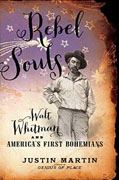Rebel Souls
Justin Martin
book reviews:
· general fiction
· chick lit/romance
· sci-fi/fantasy
· graphic novels
· nonfiction
· audio books
· author interviews
· children's books @
curledupkids.com
· DVD reviews @
curledupdvd.com
newsletter
win books
buy online
links
home
for authors
& publishers
for reviewers

 |
Rebel Souls: Walt Whitman and America's First Bohemians Justin Martin Da Capo Press Hardcover 368 pages September 2014 |
|
After vowing that, to get in synch with the departing soldiers marching to the Civil War, he would drink only water and milk and avoid “fat meats and late suppers,” Walt Whitman was too old to fight and too young to yield to asceticism gently. He was soon back to drinking lager and consuming beefsteak at a seamy saloon called Pfaff's in New York City, near Bleecker Street. But someone would ask, nonetheless, “Could there be anything more shocking and incongruous than Whitman killing people?”
It could be said that the war, though it took its toll on his emotions, transformed Whitman from an introspective poet into a loving, near-saintly nurse/brother/father to many a wounded soldier. Each day he filled his pockets with goodies for the war's victims, like a tender Santa. He advocated for the sufferers or simply kept them company. He would later write, “I do not ask the wounded person how he feels…I myself become the wounded person.” Martin, a seasoned writer (Greenspan: The Man Behind the Money and Nader: Crusader, Spoiler, Icon) seems to have found a comfort zone as he follows Whitman from New York to Washington, from hospital to hospital, from his public admiration for Abe Lincoln to his lonely late-night rambles seeking out male companionship. On the fringes of the colorful coterie were such gonna-bes as Samuel Langhorne Clemens and Bret Harte, and coulda-beens like Fitz Hugh Ludlow, who owed his failure to his fateful need for hashish. Framing his book in Whitman's middle years, Martin has composed the biography of the man and his eclectic counter-culture, a model for artistic, intellectual non-conformity well into the twentieth century. Originally published on Curled Up With A Good Book at www.curledup.com. © Barbara Bamberger Scott, 2015 |
| Also by Justin Martin: |
|
|
|
 Click here to learn more about this month's sponsor! |
|
| fiction · sf/f · comic books · nonfiction · audio newsletter · free book contest · buy books online review index · links · · authors & publishers reviewers |
|
| site by ELBO Computing Resources, Inc. | |
 A circumspect, handsome man who grew more burly and hirsute with the passing years, Whitman had found recognition as a poet early in life and then, as he once predicted, faded a bit, still re-writing his first work,
Leaves of Grass, again the year he died. But in his prime he was a darling of the Bohemian set that clustered around Pfaff’s, and clustered too around social lion Henry Clapp, who kept his own table there and was never happier than when conversation flowed non-stop. Seemingly attracted alike to the well-known acting family, the Booths (Junius Jr, Edwin and John Wilkes), the ersatz but undeniably sexy “actress” Adah
Isaacs Menken, and the wealthy Charleston wit Ada Clare (who would write that the Bohemian "must not be narrow-minded"), Whitman kept his private life private, only recording in his diary or in sentimental letters his encounters with young men (Tom Egbert, conductor Myrtle av, open neck, sailor looking…”I do not know why you do not write to me…”).
A circumspect, handsome man who grew more burly and hirsute with the passing years, Whitman had found recognition as a poet early in life and then, as he once predicted, faded a bit, still re-writing his first work,
Leaves of Grass, again the year he died. But in his prime he was a darling of the Bohemian set that clustered around Pfaff’s, and clustered too around social lion Henry Clapp, who kept his own table there and was never happier than when conversation flowed non-stop. Seemingly attracted alike to the well-known acting family, the Booths (Junius Jr, Edwin and John Wilkes), the ersatz but undeniably sexy “actress” Adah
Isaacs Menken, and the wealthy Charleston wit Ada Clare (who would write that the Bohemian "must not be narrow-minded"), Whitman kept his private life private, only recording in his diary or in sentimental letters his encounters with young men (Tom Egbert, conductor Myrtle av, open neck, sailor looking…”I do not know why you do not write to me…”).